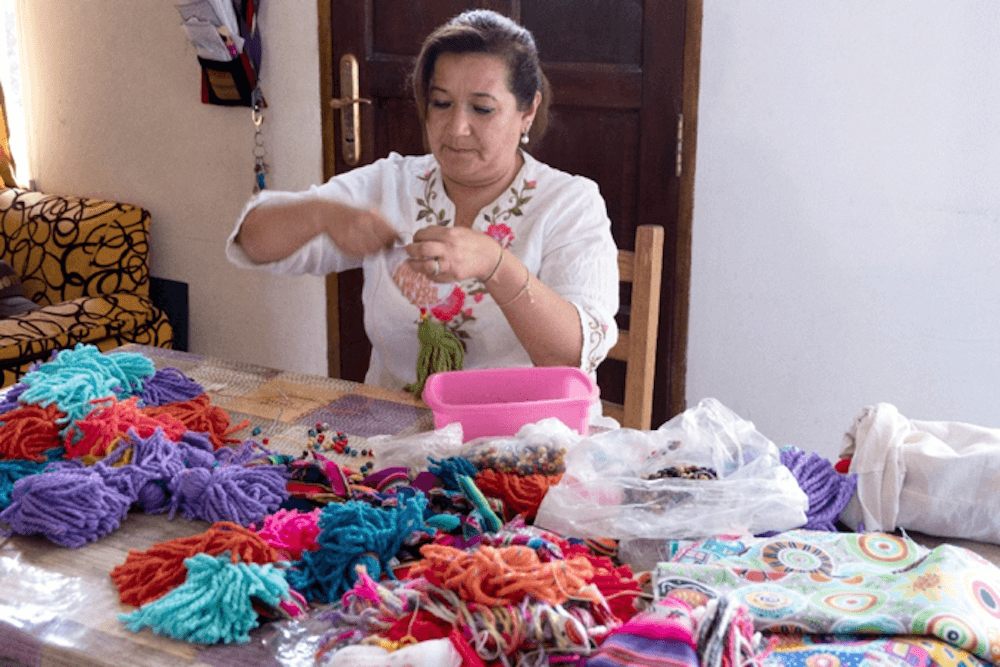
COVID-19 impacts every one of us, transforming economies, healthcare and education. Our communities are forever changed, and it’s up to world leaders, organizations, governments and businesses to act quickly to help mitigate the negative impacts of this crisis and urgently attend to the needs of the most marginalized and affected communities.
As an organization that provides financial, health and education services to underserved women in Latin America, Pro Mujer is adapting. Our health and financial teams across the region are quickly developing new ways to meet the needs of our beneficiaries, while building short- and long-term strategies to ensure women continue to receive support, so they can stay healthy and address the economic impact of stay-at-home policies.
We are already seeing how inequalities become exacerbated as health and economic resources become strained. Projections are showing that poverty and unemployment will continue to increase as many businesses shut down. In Latin America, unemployment could rise by 10 percentage points, and we could see poverty expand from 35 million to 220 million people.
Marcela’s Story
Marcela Castrillo is one of millions of women in the region who are being significantly impacted by this pandemic. As an owner of a small handicrafts manufacturer in Argentina, Marcela depends largely on sales to tourists who pass by public markets, fairs, and train stations. With the suspension of travel and a nationwide stay-at-home order in Argentina, she has lost her income.
Marcela, like so many other Pro Mujer women, are concerned as they struggle to find financial support from the government or elsewhere. Since 2008, Pro Mujer has provided Marcela with microloans to help her keep and grow her business. She and her family have also had access to basic health care at Pro Mujer’s clinics, including pediatric care for her children and gynecological care for her teen daughters.
“We understand that our health comes first. Without health, you can’t do anything. But it is really hard when you have to tell yourself that if you do not go out to work, you will not have food to put on the table. And if you go out, you could get really sick,” Marcela said. This is a recurring concern among low-income individuals across the region.
In cases like Marcela’s, our financial team is building short and long-term strategies to make sure our beneficiaries can provide for their families and do not lose their businesses. We are delaying as many loan payments as possible and reassessing our clients’ financial needs individually, a labor intensive but worthwhile process. Once mandatory lockdowns are over, our beneficiaries will also need capital to restart their businesses. Pro Mujer will be there to support them.
Accelerating a Digital Transformation
COVID-19 has had a direct impact on how we engage with our clients and patients. While Pro Mujer has been undergoing a process of digital transformation, the crisis has accelerated projects that allow us to serve our beneficiaries digitally. In Nicaragua, for example, we have ramped up our efforts to promote our digital wallet to facilitate payments among our financial services clients and to strengthen our financial support during the crisis.
We have ramped up our efforts to promote our digital wallet to facilitate payments.
Our health workers are using WhatsApp to connect with patients and provide virtual counseling sessions to answer any questions women might have about the virus or their overall health. We have already seen the spread of false information that preys on people’s levels of stress and anxiety, and we are seeing a disturbing upward trend in domestic violence and femicides during this time. This is why we have prepared our health staff on how to provide relevant information to help our beneficiaries and their families cope with this pandemic, both physically and emotionally.
We are also putting additional resources into digitizing educational materials and fast-tracking initiatives – including trainings for our entrepreneurs on how to market and sell on Facebook – and digitizing material on health and wellbeing to engage our community through video and interactive content. Despite the fact that some of our clients – and a huge portion of the Latin American population – do not have access to the internet, we are seeing a clear willingness among our clients and patients to adopt digital channels to stay connected.
A Time for Learning, Creative Solutions and Dignity
When Bolivia went on lockdown, Benigna Quisbert, a 73-year-old Pro Mujer client, had to close down her clothing shop. Like Marcela, she was left with no income. Worried about how she was going to provide for her grandchildren and about the health crisis in her community, Benigna decided to use her skills to produce face masks. She was able to secure a contract with a public hospital in El Alto, the city where she lives, to make these masks for health workers.
All of us are learning how to navigate an entirely new environment. At Pro Mujer, we are taking this moment to act quickly and at the same time reflect on what has worked for us and what needs to change so that we can build a more resilient organization that can quickly adapt to women’s changing needs.
Today, more than ever, we are seeing the critical need to build systems and structures that guarantee human rights, including equal access to fundamental resources – like health care, education, and food – and systems that allow for gender equality.
Pro Mujer’s team understands this is also a great opportunity for organizations to look at different ways of thinking and doing, to explore new horizons and prioritize the delivery of services for underserved communities around the world, and to ensure they live with dignity.









